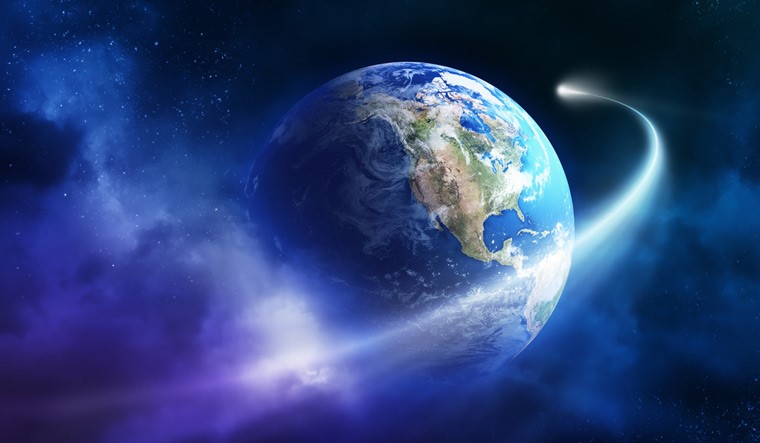How Old Is the Earth? Explained: The Startling Age of Our Planet
The Earth's age is estimated to be around 4.54 billion years, with a margin of error of about 1%. This age is based on radiometric age-dating of meteorite material and aligns with the ages of the oldest terrestrial and lunar samples. Radiometric age-dating, developed in the 20th century, revealed lead in uranium-rich minerals to be over a billion years old. The oldest known minerals, zircons from Western Australia's Jack Hills, date back at least 4.404 billion years. Calcium-aluminium-rich inclusions, the oldest solid components in meteorites, are 4.567 billion years old, setting a lower limit for the Solar System's age.

Figure 1. Earth
Figure 1 shows the process of Earth's accretion likely began after the formation of these inclusions and meteorites. However, due to varying accretion models estimating the time frame between a few million to about 100 million years, pinpointing the precise difference between Earth's age and that of its oldest rocks is challenging.[1] Determining the exact age of exposed surface rocks is also complex, as they are composed of minerals with potentially different ages.
While it's considered impolite to inquire about someone's age, the curiosity about Earth's age has persisted. Over time, various ideas about Earth's age have been proposed, but modern science has provided a concrete answer. Radiometric age dating has played a pivotal role in determining Earth's age, revealing that it is significantly older than commonly perceived. This technique has provided us with a definitive understanding of Earth's age and has also enabled us to pinpoint the emergence of the earliest life forms on our planet.
Earth is approximately 4.54 billion years old, with a margin of error of around 50 million years. This age places Earth at less than half the age of the Milky Way Galaxy, which is estimated to be 11-13 billion years old, and about a third of the age of the Universe, which is thought to be 10-15 billion years old. Scientists have ascertained the Earth's age through a method known as "radiometric dating." This technique involves measuring the last instance when the rock being analysed was either melted or disturbed enough to affect its radioactive components. Notably, the Canyon Diablo meteorite discovered in Arizona, USA, has provided the most credible estimate of the Earth's age.
Throughout history, people have held varying notions about the Earth's age, leading to a range of estimates. One prominent early theory, proposed by physicist William Thomson (1824-1907), suggested that Earth had cooled from a molten state and was around 20 to 40 million years old. Notably, this theory was met with controversy and disagreed upon by figures like Charles Darwin. However, other scientists of that era, including Hermann von Helmoltz, Simon Newcomb, and George H Darwin, arrived at similar conclusions using different factors, such as the Sun's condensation time and tidal friction.
Around 1900, Irish physicist and geologist John Joly proposed a different perspective, estimating Earth's age to be at least 80-100 million years. He based his calculation on the rate at which salt accumulates in the oceans due to erosion processes. Apart from geological research, certain Christian Bible scholars have suggested, using hints from the Genesis account, that the Earth and the Universe are approximately 6000 years old.
Life's inception on Earth took place somewhere between 3.77 and 4.28 billion years ago. While there's ongoing debate about the exact timeframe, the oldest known animal fossils date back to around 890 million years ago. However, in 2017, researchers at University College London unveiled potential evidence of life in the form of tiny bacteria fossils dating back 3.77 billion years.[2] This discovery adds to the understanding of the Earth's ancient biological history.
References:
- https://en.wikipedia.org/wiki/Age_of_Earth
- https://www.sciencefocus.com/planet-earth/how-old-is-the-earth
Cite this article:
Janani R (2023), How Old Is the Earth? Explained: The Startling Age of Our Planet,Anatechmaz, pp.479

